Report made with the support of Intermón Oxfam
Five centuries after the Conquest, a new colonization attacks the natural resources and destroys local populations. There are no caravels, or armours, or men on horseback, or faith conversions, but tractors, pesticides, tax havens, financial markets, and investors who, as Leopold II or the Catholic Monarchs, ignored the beliefs, the customs or the language spoken by the men who live in their domains. In Paraguay, the agro industry has become a great business that fumigates and ejects farmers, and produces enormous benefits for the enjoyment of a few. Their nationality? Investors.
Paraguay: a new colonization
Curuguaty. July, 2012
Few days before the dramatic bloodshed, the commissioner Arnaldo Sanabria phoned peasants’ leader Ruben Villalba, and told him they only had two possibilities. Either leaving peacefully or an armed group would show up.
«An armed group accompanied by several ambulances», added the police to strengthen the seriousness of their intentions. «In that case, bring some wooden crates too», replied defiantly Villalba.
There was still one last warning.
It was the visit of an emissary of the Ministry of Home Affairs, Elvio Cousirat, who went to the camp and kept a tense conversation with the families occupying the farm Marina Cue, a State’s land claimed as its own by Blas Riquelme, businessman and politician of the Colorado party.
«If they bring me the papers to prove that this land belongs to Riquelme, we will leave», said Avelino, one of the occupants. «Show the document!» insisted another peasant raising his voice among the chorus of protests.
The camp was presided over the national flag, as if patriotic colours were some sort of talisman that should defend them from their tragic destiny. Before leaving the camp, the public official still had a last farewell comment.
It was an ironic and offensive comment.
«You’d better go sell cookies and candies at the traffic lights of the capital» said, using a phrase that has already become a recurring joke for those who see farmers as archaic elements; an endangered species whose humble and self-sufficient way of life, based on the cultivation of a few hectares, the growth of some animals like pigs, cows, a couple of horses or chickens, and the sale of their products in local markets, they are a nuisance and a hindrance to progress.
Progress: During the last year, Paraguay grew by 13%, a spectacular rate due mainly to the agricultural industry and large-scale monoculture, especially those of soya beans.
This magnificent wealth needs very little labour, is exported in almost its entirety, is quoted on the stock exchange and pays little taxes in the country, so it has become the panacea for big fortunes and foreign investors, most of them American and European multinational companies.
However, such a huge affluence is strange to the majority of the population. Small producers are unable to compete with the low prices of big companies, farmers are forced to sell their land, genetically modified seeds are used and pesticides are sickening and killing the population, while destroying the ecosystem. Peasants assure bees have disappeared from soya fields.
According to an Intermon Oxfam study, the 80% of the Paraguayan agricultural land and livestock is owned by a tiny 1,6%. The remaining 20% of the land is split up between the 84% of the farmers. That means that more than 180 000 families don’t even own the 10 hectares considered the minimum land needed to sustain a single family, in a country where more than half of the population lives in the countryside.
While peasants fight for their land, large landowners and foreign investors compete to accumulate even more territory, impoverishing more and more little farmers. The action of rich landowners, whose fields progress as a green tide that flattens the horizon, chops down forests and isolates populations. They export millions of tonnes of soya beans —Paraguay is already the fourth largest exporter of soya beans of the world— fumigate with tractors and aircrafts, and press little farmers to abandon their traditional way of life. After selling their lands at a loss, most of these farmers live poorly in urban peripheries.
Talking about this New Capitalism, Susan George says: «We have a financial system that is completely out of control; there is a race for the resources —no matter which— between multinational companies… and above all this situation there is the crisis of democracy: illegitimate authorities that have not been elected by the citizens are the ones who create the rules of the game».
Paraguay is a good example of this new model. It is a paradise on earth for the «new conquerors of the twenty-first century»: there, money that escapes the social control and multiplies in the speculative markets, becomes invisible in tax havens and enriches those who ignore what their society needs. These new owners of the world, whose modern weapons are business operations, do not need any longer military governments to control public institutions and the State.
«I will die here», said Delfín before dying
Curuguaty. June 15, 2012.
One week after the visit of the civil servant, people who occupied the area called “Marina Cué» were alerted by the deafening noise of the rotor blades of a helicopter. The peasants, armed with some pellet guns, knives and sticks, were prepared to resist the eviction and force the negotiation, as they had done other seven times in the same place. They were, as always, protected by the presence of women and children. What they could not imagine is that this time the impact would be so devastating.
Moments before receiving a bullet in his jaw, Nestor Castro still had the courage – or the ingenuity – to say to his younger brothers:
—Don’t worry. This land is ours. Without the documents, they cannot make us leave this place.
—They are too many —replied Adolfo. That was one of his last words before leaving this world.
M. P. , who does not want to give his name, describes what he saw from the top of the tree where he was sheltered during the shooting: «Fermin Paredes was lying on the ground badly injured. He was crying. Some officers, protected with gas masks, approached to him. «Come on, shoot him!», an official said. And they finished him off right there. I saw everything from the tree. I left at night».
The lands claimed by the peasants farmers in Marina Cue have an extension of some two thousand hectares. They were donated to the State by the Paraguayan Industrial company in 1967. Then, the State gave them to the army for the use of the navy. The name of this area comes from the Guarani term Kue, which means literally «that belonged to…».
The military left the area in 1999, so Marina Cué remained abandoned until a group of farmers from the Movement for the Peasant Recovery of Canindeyu negotiated with the National Institute of Rural Development of the Earth (Indert) to give these two thousand hectares to the peasants in the context of the agrarian reform. Meanwhile, Riquelme launched the industrial cultivation of the land. In 2005, when the Indert finally went there to study how to give the land to the farmers, Riquelme, through the company Campos Morombí, initiated a trial of usucaption. He won.
In a legal framework, usucaption is a method to win ownership of a property by working it or living in it beyond a certain period of time. However, Riquelme’s case was different, because he had simply seized the land, and the trial of usucaption was full of irregularities, dark judicial influences and politic interventions, denounced by the Indert too.
Farmers, then, believed that the land belonged to the State, so it was not a private property, as Riquelme tried to demonstrate. Thus, occupation was not «an attack on private property» but a way to have access to the land to repopulate and cultivate it.
In this context, the 50 or some farmers gathered in Marina Cue could not imagine that June 15th would end with seventeen dead people, including six policemen, and an undetermined number of wounded soldiers and peasants. As reported by the Paraguayan coordinator of human rights, seven of the killed peasants were shot at point-blank range, when they had been already reduced by the attackers or had surrendered.
«Wait here. They will talk to us» Avelino said minutes before the shooting, when uniformed men appeared. They were more than six hundred, all of them equipped with bullet-proof vests and combat helmets. Attacked from the flanks in two columns, while a helicopter led the operation from the air.
«I will die here» sayd Delfín Duarte before dying.
The first bullet pierced his stomach. Badly injured, Dolphin looked for a refuge in the pasture. Policemen who found him decided to finish the job with two bullets that smashed his face and opened a gap the size of a fist in his back.
Shrouded like a candy
Curuguaty. June, 2013
Mariano Castro is another peasant. Three of his eight sons, Néstor, Adalberto and Adolfo, were among those who occuoied Marina Cué.
We meet him one year after what is now called the Matanza de Curuguaty, because it was in that district located at 300 kilometres from the capital where the tragedy took place.
«They killed my Adolfo», he says. He was 28 years old. «Néstor’s yaw was disfigured by a shot. He is now in prison. Adalberto, the youngest one —he is 24 years old—, was reached at the beginning of the shooting. Then, they pointed a gun at his ear and ordered him to run. He couldn’t move. So, assuming he was dead, they thrashed him and abandoned him in the maize field».
Mariano continues explaining that he and his sons have always worked some 10 hectares of land. However, as the boys have grown up, property has become too small for them. «They want to have their own land and their own houses. That’s why they took part in the occupation».
One day before dying, Adolfo went to see his father. «He told me the police could appear, but he was confident both parts could come to an agreement. Their lawyer had commented that things seemed right for them. They had even divided the land into plots. Each peasant with an own plot».
Tierras mal habidas. Land’s property is an unresolved issue in Paraguay, where many of the smallholder farmers —«owners»—, only have derecheras, that is to say, recognised lands without legal documents of property. Peasants, more and more needy of land to work, claim access to state lands, hundreds of thousands of hectares known as tierras mal habidas, because they are part of those distributed by dictator Stroessner among some military and policemen friends —including Nicaraguan dictator Somoza— as if the country was his own land estate.
Many of these lands are now property of the State, so agribusiness and farmers are now fighting for their exploitation in an uncertain economic and political context, where a real agrarian reform is to implement and peasants are to weak to confront big landowners who control the country.
—Press —Mariano continues— accuses us of being terrorists, they even link us with the EPP1 (a small armed group who acts in the area of San Pedro). And that is a big lie. Those who were in the occupation were born here. They grew here. And they were only asking for a piece of land. Here in Paraguay, there is a lot of land, but it is not distributed fairly. My sons do not have criminal records. They hadn’t neither robbed nor raped. Adolfo died fighting for a piece of land and I am proud of him and of his brothers.
Lucía Agüero witnessed Adolfo’s killing, and she told Mariano what really happened. Now, he can narrate the tragic death of his son:
—At the beginning of the shooting, Adolfo held his little three year-old son in his arms. He gave him to Lucía to protect the boy. Then, he raised his arms to surrender, and soldiers began to hit him with the butts of their guns until one of them shot him in his leg. When he fell down, they riddled him with bullets till his head was smashed. Lucía, who was still carrying his son, collapsed after having received a bullet in one of her thighs. After bandage Lucía’s mouth to keep her quiet, soldiers snatched the child from her and kept him safe until the end of the attack. When they gave us the boy back, he was mute. It took him weeks to talk again. As to my son, we received him after some days. He was wrapped in a piece of canvas tied on both sides, shrouded like a candy, unrecognisable, completely rotten. We have buried him near here.
—What is, in your opinion, the reason to make such an excessive deployment in the assault of Marina Cué, where 600 men were sent to confront some 50 farmers? —I ask Mariano Castro.
—That was a warning to make occupations stop. They are not interested in an agrarian reform. And they feared Lugo’s government could increase social justice —he answers half in Guarani and half in Spanish.
According to Mariano’s thoughts, that massacre was the first step for the Coup d’état that overthrew President Fernando Lugo.
Parliamentary Coup d’état: The Matanza of Curuguaty took place on June 15th, 2012. On June 21st, conservative parties, Partido Colorado and Partido Liberal, decided to make a political use of the massacre, which served them to ultimate the details of the political trial against president Fernando Lugo. Their aim was to snatch presidency from this former bishop of the Liberation Theology movement, who won 2008 presidential elections. By winning, he ended a six decades period of Colorado’s power monopoly, which had begun at the end of the fascist and openly Nazi Stroessner’s dictatorship, supported by the Colorados.
Although Lugo won presidential elections, Parliament was still dominated -93% of the congressmen- by conservative parties, Liberal and Colorado. Lugo, did not even control the executive branch of government, because he shared its control with the liberals, leaded by Federico Franco, the vice-president, the men who would captain the Parliamentary Coup d’état.
In its article number 225, Paraguayan Constitution contemplates the dismissal of the President of the Republic through a political trial in three cases: improper performance of his duties, offences committed in the exercise of his duties, or common offences.
At about six o’clock in the evening of 21st June, most of the Members of Parliament notified a formal accusation against Lugo. The Public Trial would take place one day after the announcement, at 12 o’clock in the morning. That meant that Lugo’s defense had less than 24 hours to get ready. They could only talk during 30 minutes in the trial. The expulsion was already decided, and the Matanza of Curuguaty was the main evidence for the accusation against the President.
Widely-known facts do not need to be proved
Let’s bring up some details to determine the seriousness of this political trial, which concluded as a Parliamentary Coup d’état, in a new political strategy that let factual powers take control of state structures without imposing a dictatorship regime.
The script: As we have said before, the trial was announced on 21st June. It was Thursday. In their Friday edition, newspapers explained the schedule of the trial, according to the precise information given by the Parliament. At 2 p. m., Parliament would accuse the President formally. After that, Lugo’s lawyer would have half an hour to defend his client. Right after his statement, Members of Parliament would analyse all the information. Finally -here comes the miracle!- at 6 p.m. , the reading of the dismissal process would take place. The sentence was decided in the official schedule even before the trial begun!
The evidences: the main evidence against the president was a cutting from an article appeared in the ABC, Colorado party’s newspaper, in which Lugo was accused of the massacre. During the trial, one of the Members of Parliament exclaimed while raising the cutting : «Evidences provided by the accusation are widely-known facts; they do not need then to be demonstrated».
No one, during the trial, even questioned how could President Lugo be responsible for the massacre for both sides, the congress and the peasants. No one stopped to think that it was in the Office of the Public Prosecutor where the decision of judging the peasants, instead of those who had ordered the assaut, came. Wasn’t Lugo, as the President, one of those who had attacked, so judged innocent by the Parliament?
The same day of the dismissal of Lugo, Federico Franco assumed temporary presidency of the country until the next elections, held last April.
As a reaction to the Parliamentary Coup d’état, Paraguay was suspended from Mercosur, and its presence in the Iberoamerican Summit of Cadiz, on November 2012, was «vetoed».
Nevertheless, the anger developed soon into some parental telling-off, so a few months later Franco went to Europe as if nothing had happened. He was interviewed in the Spanish television, where he stated self-confidently that what they had extinguished Chavism in Paraguay, so Spanish businessmen would have no better place to invest their money than Paraguay.
Journalists —who Franco called by their first name, after consulting it in a piece of paper that served him as crib sheet— listened to him swelled with pride, without making him uncomfortable questions.
Interlude with church sermon
Federico Franco governed the country for a year before the investiture of the new elected President, Horacio Cartes, last 15th of August. Here is an illustrative anecdote to show Franco’s boldness and self-confidence:
It was during de 132 anniversary of Villa Florida’s church. Federico Franco took a seat in the area reserved to authorities. Bishop Melino Medina officiated the mass. When the moment of the sermon arrived, bishop Medina began to talk about the dangers to human-health of genetically modified seeds and large-scale fumigation.
An annoyed Franco rushed in to the pulpit to interrupt Medina, and instruct people in the church «Are you suggesting, Monsignor, that if I knew they are a concern to public-health I would permit them?», he told in his brand new apostolic role.
«Thanks to genetically modified seeds —he continued— farmers will reduce the use of pesticides, so production will increase in terms of quantity and quality». After that, he asked the bishop for the documents that proved the so-called dangerousness.
Bishop accepted the challenge telling him he would visit Government’s Palace accompanied with some experts in the field as soon as Franco would invited him.
Let’s continue with the mass: Praise the Lord.
Criminalizing the peasant
Curuguaty. July, 2013
Jorge Galeano is one of the leaders of Paraguayan Agrarianism, and took part in the electoral campaign that took bishop Fernando Lugo to the presidency of the country.
We met him in Curuguaty last June. As Mariano Castro, he thinks the Matanza of Curuguaty is a way of harassment on peasants who fight for the land.
—Lugo received a blow from the inside of the system when some of the ministers of the Liberal party he had appointed plotted against him with Colorado party. The Coup had three main objectives: to spread a criminalisation campaign against peasants to stop the agrarian reform; to overthrow the President with a political trial apparently legal; and finally, to go back to a weak government easily manipulated by agribusiness and mining multinationals, cattle industries and property companies.
—Property companies too?
—Do you know who is one of the richest men of the country thanks to land sale and construction? The answer is Aldo Zuccolillo, the owner of ABC. These two activities have become a huge source of money. Zuccolillo buy pieces of land from peasants in exchange of tiny properties near the cities. Then, he sells great areas of agricultural land to multinationals and foreign investors.
—The new temporary President declared that foreign investors in agribusiness and biofuels were of national interest.
—For us it is a tragedy. And we all are affected. You may not know it, but in Barcelona’s harbour Bunge -a multinational specialised in farming and exporting transgenic soya- have its silos. That is how actual economy works: you benefit from the results of an unknown business. The only thing that make it attractive is its price. However, low prices ruin our farmers’ lives.
—You were not far from the agrarian reform…
—But we did not make it. Now, the tide has turned against us, and if we don’t want to die we must rebuild this desert, once full of trees, animals, little fields and clean water sources. It is our task to change the cycle again, to stop this inhumane system that controls our country and involves you all as customers and investors. Even if you don’t want to hear it.
A chocolate bar for Children’s Day
Colonia Santani. July, 2013
I travel dirt roads untill Santani peasants settlement, where I will visit a community of 60 families. Fifteen years ago, each of them got eight hectares and a half from a huge property that Ruiz Díaz donated to the nation. He had received it as a gift from general Stroessner.
We meet Pedro López at his little farm, consisting of some cabins, an independent wood store, a latrine, a community water tank and the pens. He grows moringa for medicinal use, cassava, and some other products for their own use.
While we talk, his wife takes the grains out of corn cobs.
His piece of land is isolated between large soya fields, so what once was the usual scenery, has become an oasis, a little protuberance in the middle of an undulating horizon of flat fields that spread beyond what the eyes can see.
Pedro explains me that 26 families have already sold their properties to the multinational which presses them to control the land. However, life does not improve for them after selling. «That is why we stay. I don’t want to go selling candies at traffic lights». This sentence sounds as a mantra in his mouth.
Pedro and his wife have 13 children. The youngest are two 11 year-old twins, Anabel Rocío and Rocío Anabel.
Massive fumigation of soya fields has change Pedro and his family’s lives. Bees have disappeared, plants are drying up, and they don’t know why Adela, his 18 years old daughter, died, but they are convinced her death was caused by pesticides, which have made sick other people in the area. Some women have lost their babies, and Nelson, another of their sons, who is 28 years old, has big headaches, cannot sleep and looks like if he has got old too quickly. The river is contaminated too, and its water, once pure and crystalline, now causes infections on people’s skin.
—What do doctors think it is about? —I ask.
—We only receive the doctor once a year. —He answers.
Fields that surround them are alternatively cultivated with soya, corn and oats. They are fumigated without warning the families, no matter neither if it’s day or night nor the direction of the wind, even if it is blowing towards farmers’ houses.
He has protested many times, but he has never been heard seriously. However, every year, for Children’s Day, the multinational send an employee who gives children chocolate bars.
—They give one chocolate bar for each child —tells me Pedro while pointing at the twins.
Land, price and vengeance
Asunción. July, 2013
«For Guaranis, land has never been a mere means of economic development», says Bartolomeu Melià.
Melià, is a 81 year-old Majorcan Jesuit that has nothing to do with the owners of Melià Hotels. His wisdom has been recognised by the prestigious prize Bartolomé de las Casas. He has studied Guarani language and indigenous people from Paraguay and Brazil, and lives surrounded by some 14 thousands of books focused on these topics. Despite of this fact, he emphasizes that he has also make a lot of fieldwork.
—I lived for three years with a recently integrated indigenous group. That was the first time they saw white people. Each morning, we painted our bodies, and I was naked like all of them, excepting my glasses, of course!”
—What was the name of the group?
—They were the Enawene Nowe, that can be translated as “Hombres he aquí auténticos”. I went to Brazil because dictator Stroessner threw me out of Paraguay. He was fed up with that Jesuit who cared for Indians. And he made me a favour. It was really a blessing to spend time with the Enawene Nowe. When Stroessner’s power fell, I returned to Paraguay and brother Vicente Cañas remained there. His death was commissioned by some local landowners, who wanted to control Indian’s land.
—You have said before that, for Guaranis, land is more than a way of life…
—Land is what they called tekoha. Teko means character, way of life, custom. That’s why land is such an important thing for them. It is the place where they develop their character, their customs. Jesuits took from there the idea of «land without evil side», good land where they could live easily, that gave all the resources they needed to live. Land that guarantees the party and the banquets, too. So the land has and economic, ecological and a mythical dimension. The economical system of reciprocity comes from this world view, based on his idea of work, Jopoi. For them «work» means share and exchange. Price, in which lays all contemporary market economy, was unknown for them. In fact, when they want to refer that something is very expensive they say hepy eterei. Do you know what does it mean?
—I have no idea.
—It means «Revenge is very expensive!» Price is related to revenge for them. Their understanding of economy is absolutely opposite of ours. We must learn there are other ways to understand economy, as for example, the economy of reciprocity, of exchange.
—They are very far from our idea of «progress».
—Paraguay emerged from a colonial process that had begun in XV and XVI centuries. It has not ended, because now we are witnessing the continuation of that former genocide. Historically, Occident has not developed a critic position to judge its own actions in the past, because every colonial mission has been carried under the idea of «civilize». That conviction has justified what now we called «collateral damages». So colonizing countries write History according to their own system. However, nobody is willing to listen to colonized voices. During Jesuit missions, Guaranis wrote extraordinary chronicles we can read in its original version in Madrid, where they described war and how it devastated their cultures. These texts are inexplicably ignored in official History. To make it clear, if Catalonia history was written by a writer from Madrid or by one from Girona, it would be very diferent, of course. I recently published an article which title was «Una historia de genicidios y otros (oc)cidios». My aim was to explain how, while exterminating their people —genocide—, we tried to make disappear their culture —etnocide— and their territory and their ecosystem —ecocide—.
—Are markets and multinationals the new colonizers?
—Let’s use our common sense. Do you think it is normal that some people own thousands of hectares while there are people who have nothing? If they have such an amount of land, it is because others have lost everything. It is even more unfair when we know that these land owners neither produce benefits for the country nor encourage employment.
—Where does the State get the money?
—From the VAT! The biggest employer of the country is the State…but I’m not but a Guarani scholar…
—Talk me about Lugo…
—Lugo! Oh, Lord! The Church! It is said that there is no need to jump into politics, but even the Nuncio pressed to overthrow President Lugo. Anyway, he governed as a bishop would do…
—How do bishops govern?
—Have you ever deal with bishops? A bishop welcomes you. «Well», he said while taking a notebook. He listens and takes notes while you are talking. «Mmmm». He thinks. And then nothing. At first, we saw Lugo with hope. But he governed like a bishop. And scared everybody. Look what happens in Brazil, Bolivia, Ecuador, Peru. North America only have everything tied up in Colombia. And Paraguay was essential. They just could not accept Lugo’s vision. I imagine he has already discovered how they organize the well-known political trial…they are so rude and scoundrel! And I do think here we have fair laws and a good Constitution. The problem is how they interpret them. Could I tell you a private anecdote?
—Of course.
—This year they wanted to give me a very important prize, which I rejected for political reasons. They didn’t care and they put me in the list of awarded people. They made the award ceremony, where somebody I don’t even know pick the prize on my behalf. Even if I have not received it, they have published the contrary. And they don’t care. Fortunately, the history went to public and I could explain why I didn’t want to be awarded by this government.
Me, supreme
Elections: After Fernando Lugo’s removal, presidential elections were organized last April. They were won by Horacio Cartes, a 54 year-old and millionaire businessman, member of the Colorado party. Elections were a catastrophe for Liberal parties.
Cartes began his presidential career on 15th August, in a ceremony where all European relevant presidents, except from the Prince of Spain, Felipe de Borbon, were absent. Among other people invited to the ceremony, we find F.C. Barcelona’s president, Sandro Rosell, as well as Real Madrid President, Florentino pérez.
The new president of Paraguay also had its own football club, the Libertad de Asunción, as a clear example of a new generation of millionaires turned into politicians.
His political career has been astonishingly fast. He voted for the fist time in 2008 elections, in 2009 he joined the Colorado Party, and in only three years he has passed from ignoring politics to be anxious for occupying the presidency of the country.
Who once was a pilot, he owns now a cigarette factory, a bank, several tobacco and soya fields, and he exports wood. The DEA has pointed at him as one of the main drug dealers in his region, in a country where drug production and traffic are massive. Wikileaks documents link him with a money laundering network. And despite of all of these informations, Northern friends, afraid of Chavism, see him with hope.
«God blessed me with business skills, that I want now apply to politics», says this new messiah, whose priority is end with poverty. He has already refused his salary as president and he is willing to use his money to help the country paying civil servants’ wages, for example. In this new political system, the State acts in a commercial way; it is now some sort of private property with a public use, where good or bad administration is under «owner’s control».
Curuguaty. July, 2013
I talk with a peasant at Amistad square, in Quruguaty. In 2008 he voted for bishop Lugo. Now, his vote has gone to Horacio Cartes.
He tells me that, days before presidential elections, Colorado party organised a tempting propaganda act, where over ten thousands of kilograms of meat were delivered to peasants.
—One kilogram for every peasant. As a gift! —he says.
An envelope containing the appropriate ballot paper accompanied each of this kilograms.
—Why not taking the meat and changing the ballot paper? —I ask.
He stares at me, astonished. He answers after what it seems an eternity. Still shocked, he says:
—We couldn’t do it. They would notice.
Clearly, peasants don’t consider the idea of legal elections. For this peasant, politicians are still messiahs. Demiurges of punishment, of guilt, of reward. «Me, Supreme» in the magnificent words of Augusto Roa Bastos, who described wonderfully this kind of Perpetual Dictators who act as fathers chosen by divinity forces to govern men realms.
Photograph: Pablo Tosco (Full gallery here)
The article was translated by Carolina Camarmo
In Oxfam work in Paraguay since 1991 strengthening farmers’ organizations in their struggle to defend the right to their land and support family farming. If you want more info, click here.
_______________________________________________________________________________________
1 Paraguayan People’s Army



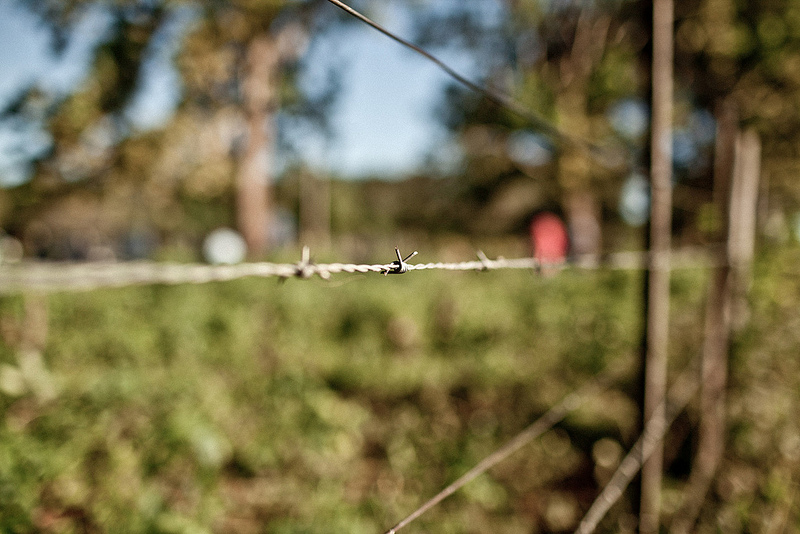
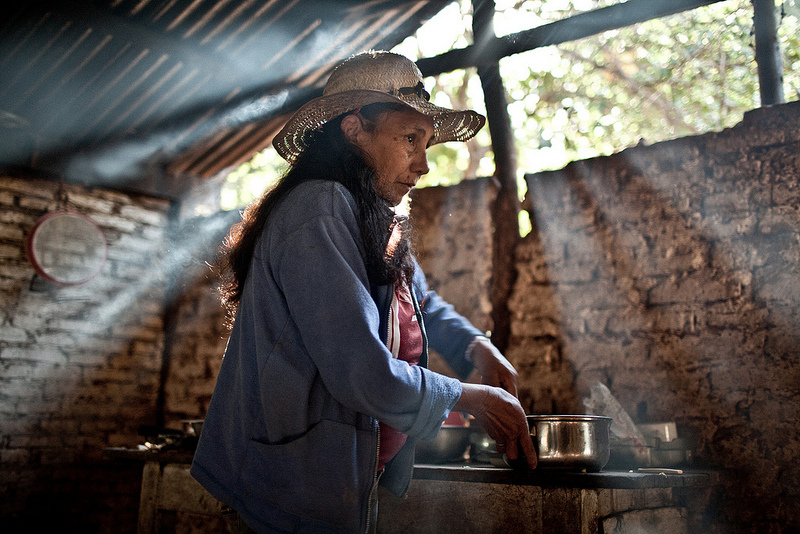
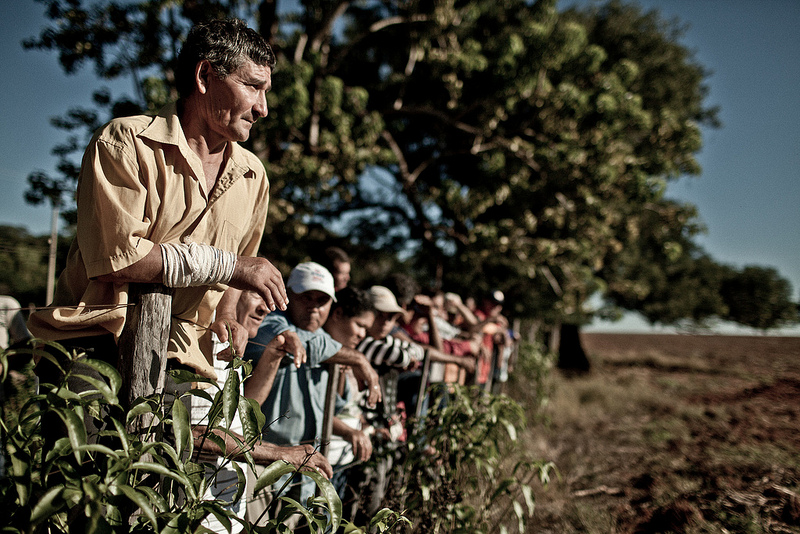
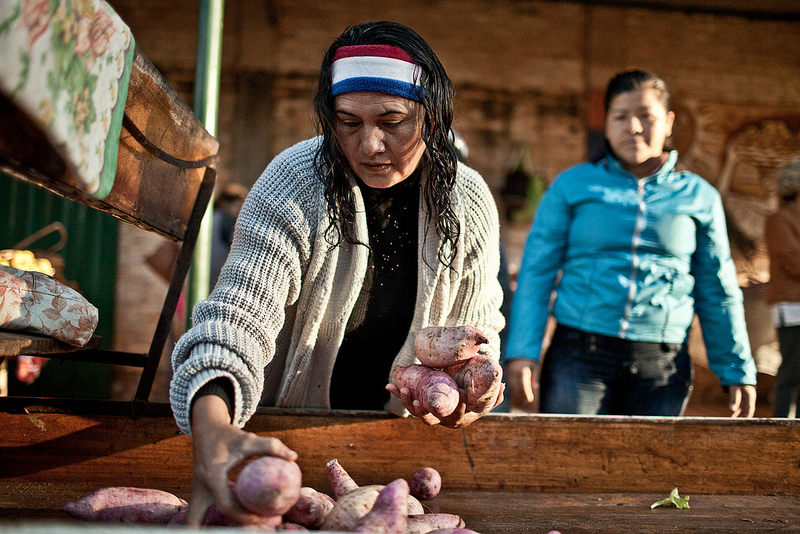
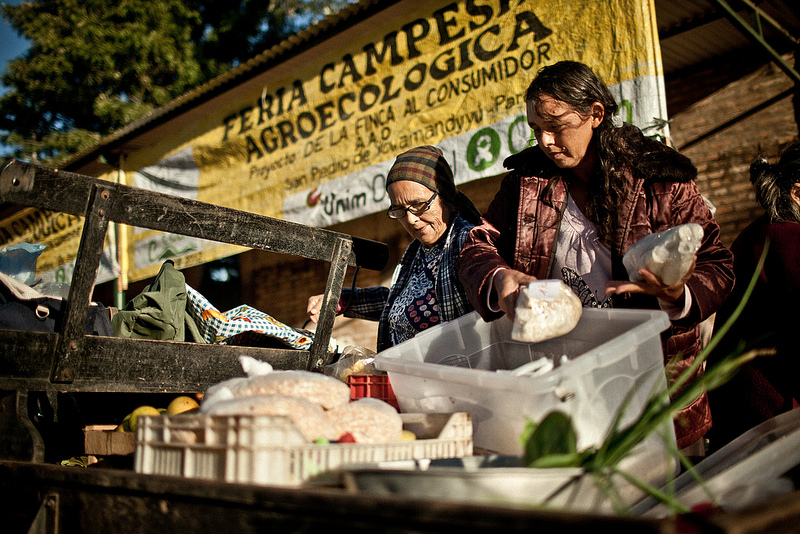
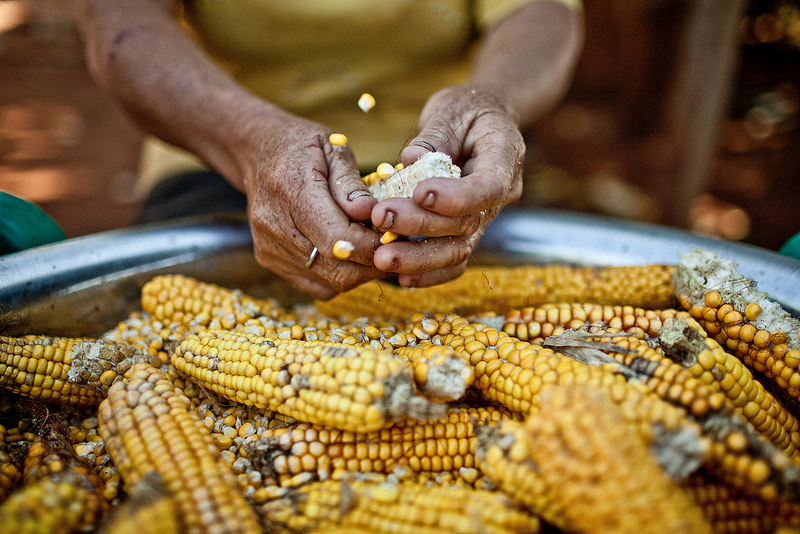
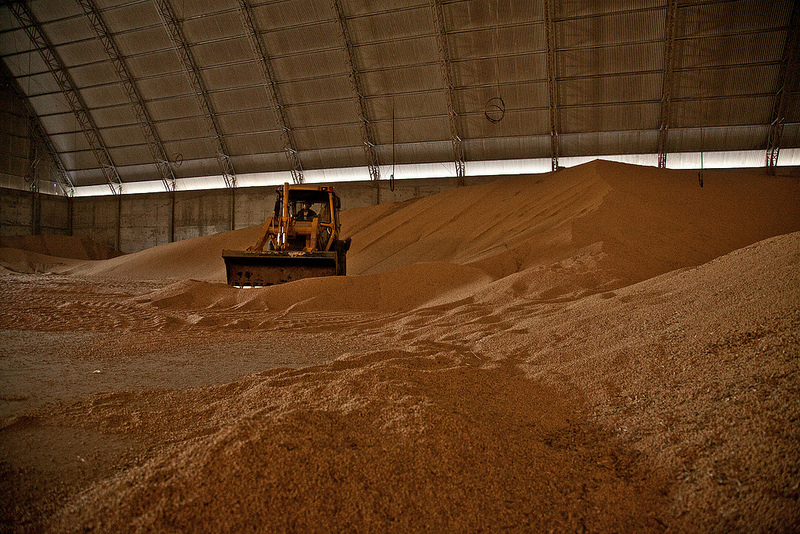
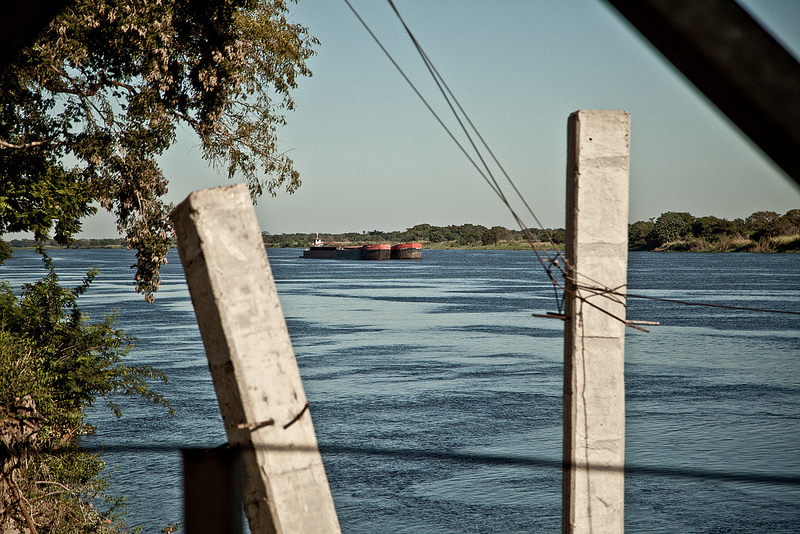
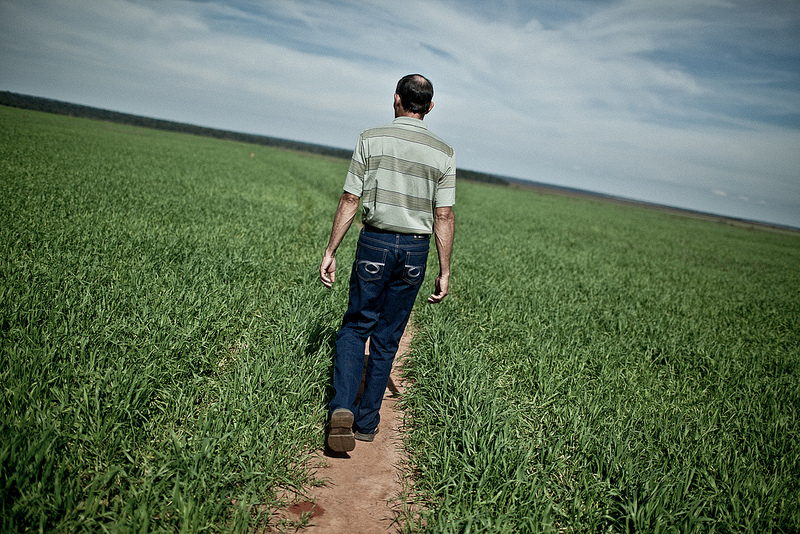
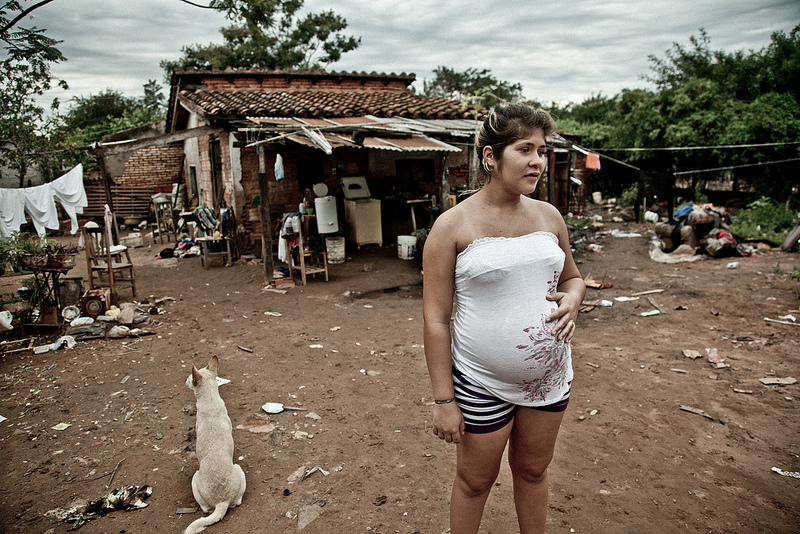
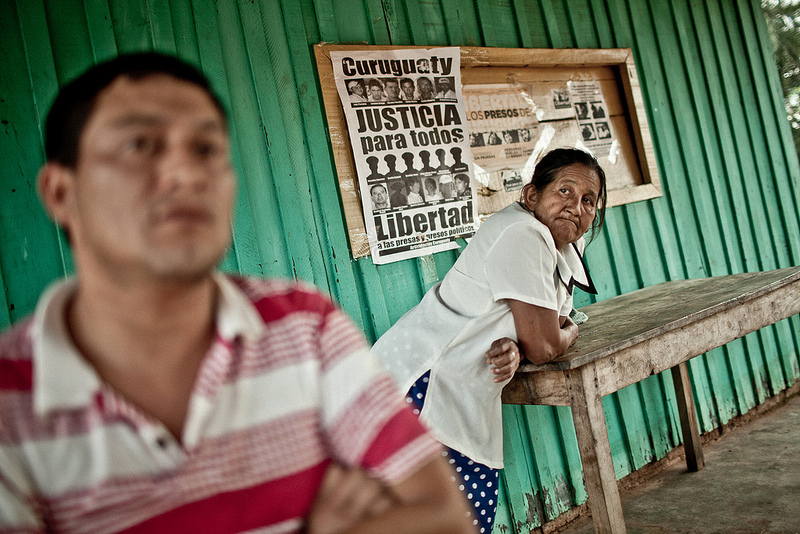
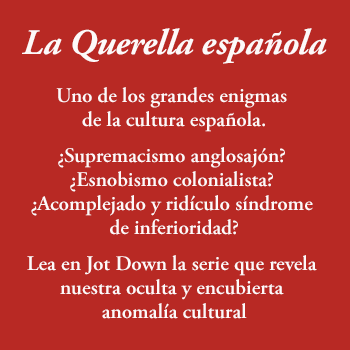
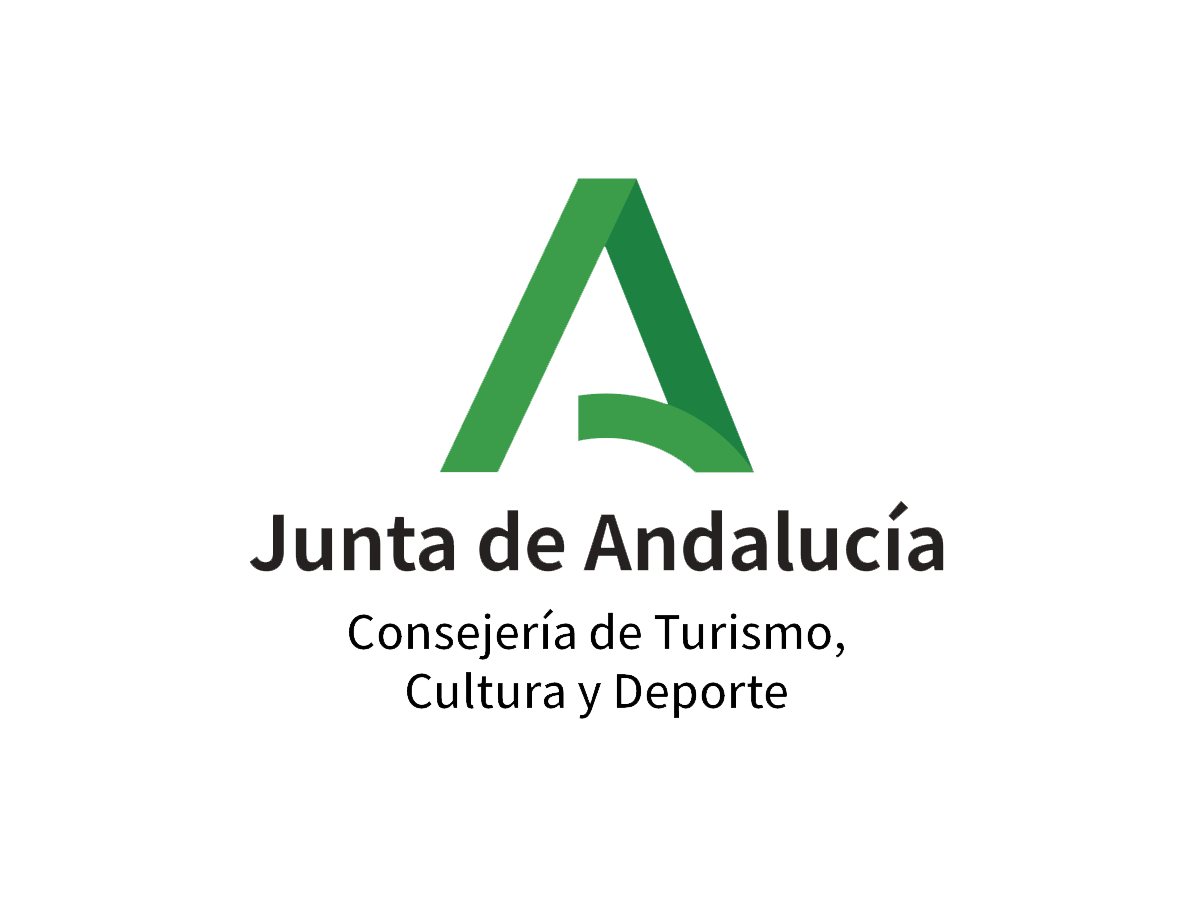
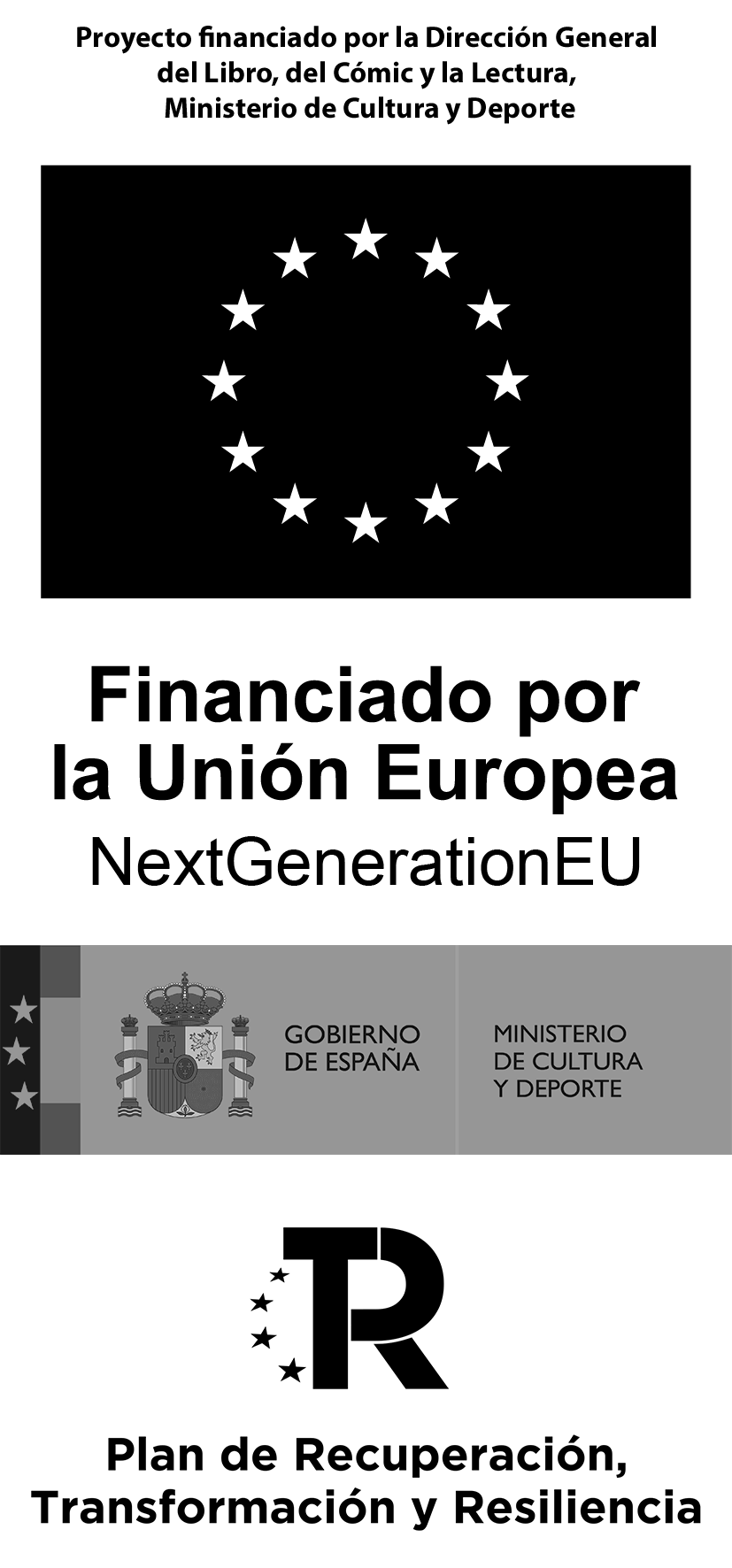




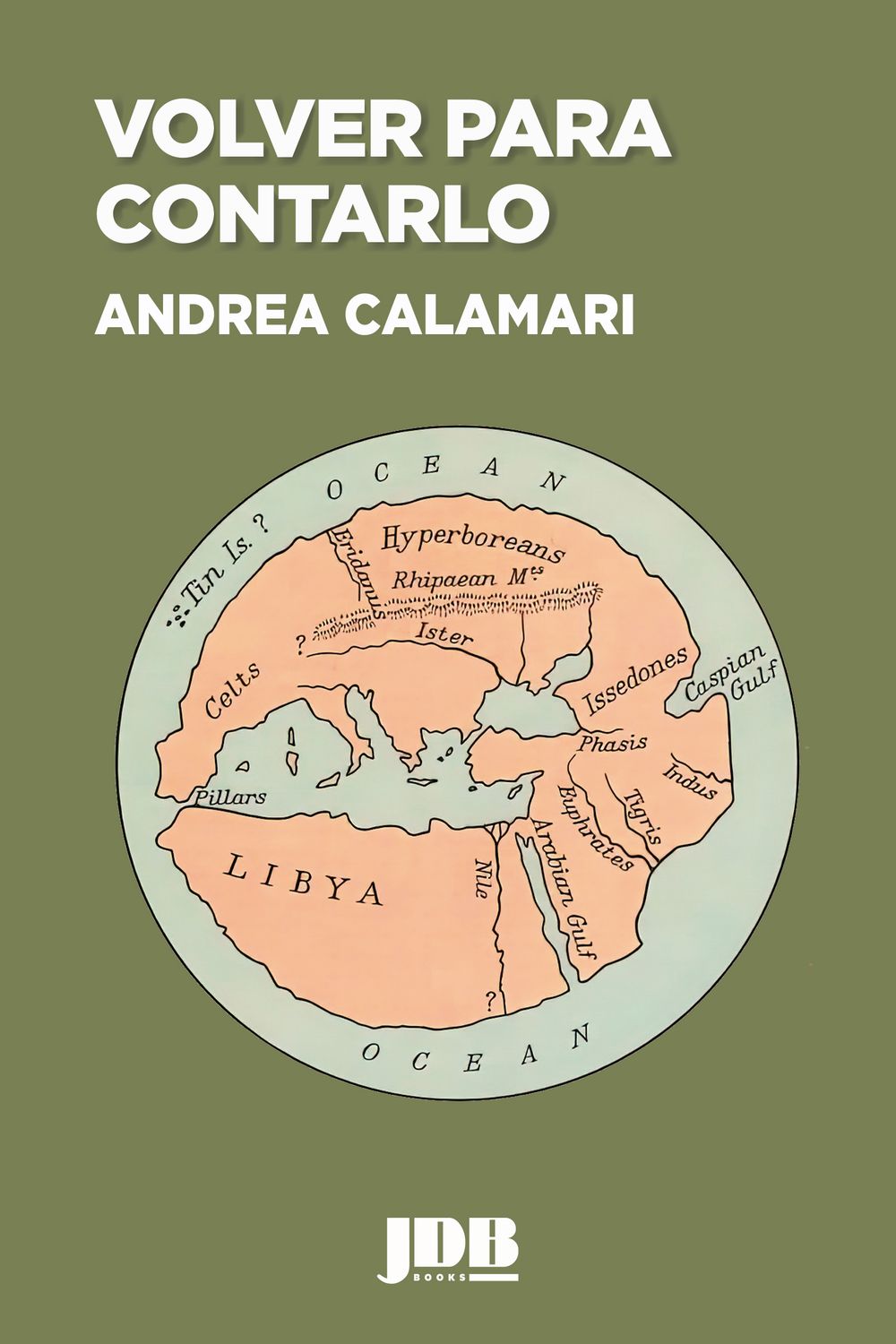
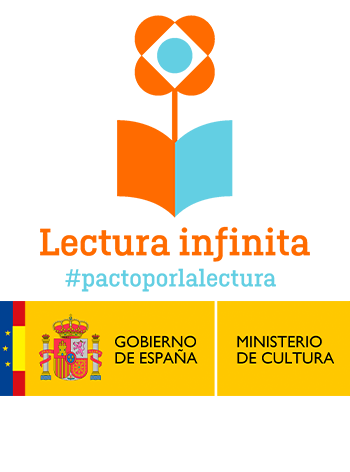
Pingback: Paraguay: una nueva colonización